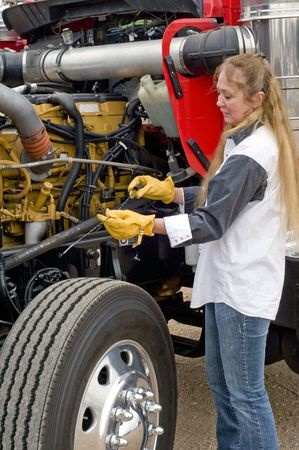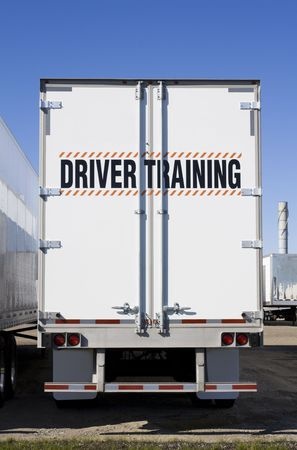Truckers Health & Fitness
Truck Drivers Deliver More Than Christmas Cheer
There are those among us who are very fortunate. We are in the throes of cleaning up the vestiges of the Christmas season. Many are taking cardboard boxes to the recycling depot, making turkey soup with the leftovers, boxing up an artificial Christmas tree or dragging a once-live one to the curb for pick-up. It would be interesting to assess how many trappings of Christmas would be missing if it weren’t for the dedicated truck drivers across North America – those men and women who earn their living delivering our stuff. It seems that it’s truckers who are really at work behind the scenes, not Santa’s elves.
Healthcare Heroes
Not only are truck drivers something of unsung Christmas heroes, they are also healthcare heroes. While I can’t imagine any truck driver that moonlights as a neurosurgeon, truckers are responsible for potential advances in healthcare in a rather unintentional and roundabout way.
The life of a truck driver has traditionally been a sedentary one. About a decade ago there were articles and headlines bemoaning the fact that the life expectancy of a truck driver is 10 years less than that of the average male. The claims have since turned out to be bogus. A scientist was completely misquoted but the idea has taken on a life of its own and moved into the realm of fact. If you don’t believe me, just Google it.
Truckers Health & Fitness – The Canaries in the Coalmine
Nonetheless, the truckers of decades past have unwittingly provided scientists with a large sedentary sample population. Along with the stereotypical overuse of stimulants such as caffeine and nicotine, and diets deficient in fresh fruits and vegetables, the inherent sedentary nature of trucking has resulted in some very negative consequences. It is a common fact that a sedentary lifestyle does have detrimental effects on life expectancy and health in general. Due to the traditionally sedimentary lifestyle of truck drivers, the profession itself has served as a sort of “canary in the coalmine” for the general population. Problems that were observed in career truckers are now, several decades later, being observed in the general population. Why?
Sedentary Leads to Sickly
Our society is now largely computer based and therefore largely sedentary. According to Moncton University’s Professor Michel Johnson, co-author/researcher of the Healthy Driver Research Project, since the 1980s the average workday has gotten progressively longer. Our technology-driven society, where many people are glued to a desk for longer and longer periods of time, is wrecking havoc on our health. According to Professor Johnson there have been no specific longitudinal studies targeting truck drivers per se, but if we apply what has been observed from the lives of career truckers of the 50s, 60s and 70s (and the increased incidence of diabetes and heart disease for example), we can see where our own current sedimentary society is going. The effects are upon us even now to the point that children are being adversely affected. This generation’s children tend to be highly prone to inactivity due in part to handheld devices, computers and “online everything”. Childhood obesity and diabetes rates are soaring. Professor Johnson predicts that despite the tremendous advances in other areas of healthcare, this is the first generation whose children will have a life expectancy less than the life expectancies of children born in the 1960s. This is serious cause for alarm.
Healthy Lifestyle Choices, Healthy Truckers, Healthy People
There is hope however. An entire movement is afoot in the trucking industry which has done a lot to combat the old stereotype of a beer-bellied, cigarette-smoking, coffee-and-coke-swilling, potato-“chipaholic”, heart-attack-waiting-to-happen trucker. This new generation of road warriors builds health and fitness into their trucking lifestyle. They run marathons, compete in ironman competitions, do yoga, drink water, eat fruits, vegetables, and yes, even kale and quinoa. If they are able to honour a commitment to a healthy lifestyle while on the road, how much more should we, who have constant access to a produce section and safe places to walk/run/swim/garden/ski/skate/surf/hike, be inspired to do the same.
As human beings we have the power to choose. Why not choose to make a few lifestyle changes for the better? Why not learn from those truckers who have gone before us and paid the price for an overly sedentary lifestyle? We know better now. Why not put that knowledge to good use?
 Rig Logistics is an asset-based private carrier based out of Calgary, Alberta, Canada. Please contact us if you are interested in driving for a carrier who is in it for the long haul, or if you are in need of reliable supply-chain solutions.
Rig Logistics is an asset-based private carrier based out of Calgary, Alberta, Canada. Please contact us if you are interested in driving for a carrier who is in it for the long haul, or if you are in need of reliable supply-chain solutions.
OTR Web Solutions gratefully acknowledges the contribution of Professor Michel Johnson at the University of Moncton who provided inspiration and very helpful information used in the writing of this blog.

 other motor vehicles. The routes LCVs have available to them are restricted, and the units themselves are subject to special licensing. Furthermore, only highly experienced drivers can operate LCVs.
other motor vehicles. The routes LCVs have available to them are restricted, and the units themselves are subject to special licensing. Furthermore, only highly experienced drivers can operate LCVs. our owner started out as a truck driver himself, the company has a real consciousness when it comes to drivers. We understand what makes our company successful and we do our best to address the issues, large and small, that are important to truck drivers.
our owner started out as a truck driver himself, the company has a real consciousness when it comes to drivers. We understand what makes our company successful and we do our best to address the issues, large and small, that are important to truck drivers. Ribbon Task Force on the Driver Shortage in Trucking.” The report’s contributors were made up of people involved in the CTA at the board or executive level, most of whom were actively involved in the operation of a transportation company. The task force concluded that indeed, “The trucking industry in Canada is facing a long-term, chronic shortage of qualified drivers. In some regions of the country (e.g., western Canada) and some sectors of the industry (e.g., irregular route long-haul trucking vs. local/regional operations) this is already in evidence.” Furthermore, the report noted that “most Canadian motor carriers…say that looking ahead the shortage of truck drivers is their number one challenge.”
Ribbon Task Force on the Driver Shortage in Trucking.” The report’s contributors were made up of people involved in the CTA at the board or executive level, most of whom were actively involved in the operation of a transportation company. The task force concluded that indeed, “The trucking industry in Canada is facing a long-term, chronic shortage of qualified drivers. In some regions of the country (e.g., western Canada) and some sectors of the industry (e.g., irregular route long-haul trucking vs. local/regional operations) this is already in evidence.” Furthermore, the report noted that “most Canadian motor carriers…say that looking ahead the shortage of truck drivers is their number one challenge.” The changes that new technology has wrought in the consciousness of consumers has pushed the transportation industry to grow, evolve and up its game. It is challenging to keep pace with the escalating demands, but technology has cultivated for us an even greater awareness of the importance of customer service.
The changes that new technology has wrought in the consciousness of consumers has pushed the transportation industry to grow, evolve and up its game. It is challenging to keep pace with the escalating demands, but technology has cultivated for us an even greater awareness of the importance of customer service.